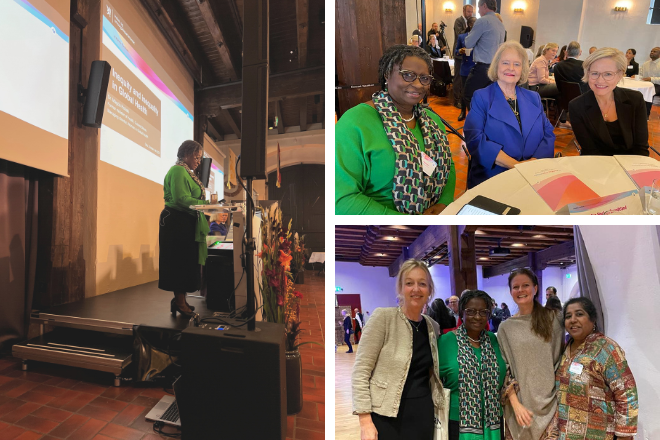The Norwegian Ministry of Health and Care Services and the Centre for Global Health at the University of Oslo hosted a symposium entitled, A World in Transitions: Implications for Priorities and Efficiencies in Global Health on October 14, 2022. Women in Global Health Managing Director, Dr. Magda Robalo was invited to reflect on ‘Inequity and Inequality in Global Health.’
Dr. Robalo’s 6 points to focus on to address inequality and achieve efficiencies in global health:
- Transparency and Accountability: There is a mismatch between public perception and current evidence, which eroded trust. We need to establish clear accountability for promises made and change the narrative from “leave no one behind” and “to reach first those who are furthest behind,” especially women and girls from vulnerable groups, who face the greatest financial and social barrier to assessing services.
- Measurement: Inequalities will remain undetected and unexplained if not measured and recorded. Our policies to tackle inequities in health must be gender-responsive, intentionally addressing the needs and priorities of all genders, to be effective.
- Evidence Based Political Choices: We need to build health systems that will respond to the needs of the entire population. Exclusion of disadvantaged groups from national responses hinder full health protection for all. Applying an intersectoral, ‘whole-of-government’ approach to protecting health, including health impact analyses of policies outside the health sector, with attention to demographic evolution. It will be important to foster technological advancements and innovation through public, private and civil society partnerships.
- Powerful collective mobilization through assertive collaboration and smart partnerships: Intentional effort is needed to enhance the funding mechanisms and networks supporting change. Several global initiatives such as PEPFAR, GFATM, PMI, GAVI, GFF and others, coupled with overseas development assistance have invested several billions of dollars into health programmes over the past twenty years, with disappointing results on health systems strengthening. Strong partnerships are needed between academia, policy, and front-line health and humanitarian workers. The challenges are too great for governments alone to be able to fund and deliver health services. Harnessing civil society and the private sector to support government led reform will be essential.
- Redress the gender imbalance in global health leadership: Women are the majority in the global health sector yet marginalized in leadership. This violates women’s right to equal representation and undermines health systems, which miss their talent, perspectives, and expertise. The Women in Global Health approach to leadership is to ask who is not at the decision-making table, to ask whether women are 50% of decision makers and to ask which women and which men are present? Women are underrepresented in general in global health but women from low-and middle-income countries are particularly underrepresented. Change is best led by those with lived experience of their context. Countries that have achieved significant levels of gender equity such as Norway should not sleep in their laurels as progress is fragile. It is important to remain vigilant, avoid the trap of overconfidence and not allow complacency to set in.
- Finally, strengthen multilateral institutions.
We cannot build strong, peaceful societies on exclusion and we cannot ask women particularly, to return to business and inequality as usual after the extraordinary contribution they have made on the front lines of health systems. It is time to go beyond reimagining an equal world and make it happen.

